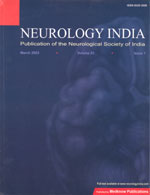
|
Neurology India
Medknow Publications on behalf of the Neurological Society of India
ISSN: 0028-3886 EISSN: 1998-4022
Vol. 54, Num. 3, 2006, pp. 317-318
|
Neurology India, Vol. 54, No. 3, July-September, 2006, pp. 317-318
Letter To Editor
Whither neurosurgical teaching?
Ramesh VG
Department of Neurosurgery, Chengalpattu Medical College & Hospital, Chengalpattu, Tamil Nadu
Correspondence Address:Department of Neurosurgery, Chengalpattu Medical College & Hospital, Chengalpattu, Tamil Nadu, Email: drvgramesh@hotmail.com
Date of Acceptance: 09-Jul-2006
Code Number: ni06107
Sir,
Neurosurgery is both an art and a science. The art of neurosurgery can be learnt by working with a senior neurosurgeon, over a period of time. But the science of neurosurgery has to be learnt from intense reading of textbooks, journals and elucidation of difficult topics by a masterly teacher. Many of the concepts in neurosurgery and applied basic sciences can be better learnt with the help of a good teacher of neurosurgery. Much of the clinical acumen is gained at the bedside teaching by a good teacher. Moreover, the teacher of neurosurgery serves as a role model by his discipline and work culture. Hence the role of a teacher of neurosurgery is enormous. But unfortunately, the species of dedicated teachers of neurosurgery seems to be fast dwindling. According to many of the senior retired professors, teaching and academic sessions are fast deteriorating even in reputed neurosurgical teaching institutions. There seems to be an inexplicable apathy both among the faculty and the trainees towards these teaching programs. This is an unhealthy trend and may prove very costly in the near future.
The reasons for these maladies are many-fold: 1) The main reason is economics. The senior consultant neurosurgeon in a private corporate hospital makes at least ten times more money than a full-time dedicated professor of Neurosurgery in a teaching hospital. Hence, many of the bright young neurosurgeons who join as faculty in the teaching hospitals quit the job after a few years, after acquiring professional experience and join private hospitals. The teaching institutions lose many talented teachers this way. 2) Another reason seems to be due to lack of proper environment and lack of encouragement and financial support for clinical and basic research. Though the clinical material is enormous in most teaching hospitals, the lack of proper facilities and financial support deters research, documentation and publication, which is so essential for a postgraduate-teaching neurosurgery department. 3) The third important reason is lack of dedicated, motivated neurosurgeons to take up teaching. The task of being a neurosurgical teacher entails hard work. He has to read extensively and update his knowledge constantly. He has to maintain high moral and ethical standards to serve as a role model for the trainees. These need a lot of self-motivation. 4) In many places, neurosurgical teaching is a part-time job. To meet the financial needs, the teachers devote less and less time for teaching and academic activities and concentrate more on lucrative private practice.
There is an urgent need to resurrect and promote interest in the profession of teaching Neurosurgery. Otherwise, the future generations of trainees in Neurosurgery and the society at large may have to pay a heavy price. Teaching of Neurosurgery must be made a full-time job. The financial needs of the teachers have to be taken care of in order to prevent brain drain of talented teachers to private practice. The salaries may have to be hiked at least three-fold. There must be provision of all infrastructure facilities for meaningful clinical work, teaching and research work. These will require proper increase in funding. There must be quality assurance of teachers or neurology by periodic evaluation of their performance, both by the hospital administration and feedback from the trainees in neurosurgery. The conduct of periodic clinical meetings, clinicopathological conferences, journal clubs must be made compulsory and must be made mandatory for recognition as a postgraduate teaching department by the Medical Council of India . The Neurological Society of India should take up a proactive role in the implementation of these suggestions. A committee comprising of present and past senior professors has to be set up, which has to interact with the Central and State Governments and Universities and take steps to protect the profession of Neurosurgical teaching. The committee should also highlight the problems faced by teachers of neurosurgery in the media and create public opinion. The teachers of neurosurgery should take pride in their work. They are not only treating the present-day neurosurgical patients but are also treating the future neurosurgical patients through their trainees.
Copyright 2006 - Neurology India
|
